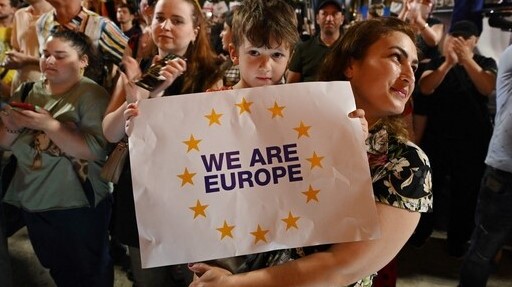In the heart of Tbilisi, a powerful message resonates as citizens march in unison, asserting their right to European identity and rejecting the encroaching Russian influence. This demonstration, aptly named the “Freedom March,” symbolizes a pivotal moment for Georgia—a nation at the crossroads of East and West, making a resolute stand for its future.
The Spirit of the March
The streets of Tbilisi were awash with the colors of the European Union as thousands of Georgians gathered to voice their commitment to European values. The march, which began at Republic Square and culminated at the Parliament of Georgia, was not just a protest but a declaration of the people’s will.

Chants of “Yes to Europe! No to the Russian law!” echoed through the air, a clear rejection of legislation perceived to undermine Georgia’s sovereignty. The crowd, a tapestry of young and old, represented a society united in its diversity, each step forward a stride towards a European future.
Voices of the People
Among the sea of flags and hopeful faces, stories of determination emerged. Individuals spoke of their dreams for a Georgia that embraces democracy, human rights, and the rule of law—principles enshrined in the European ethos.
The march also served as a platform for civic leaders to amplify their message, calling for resistance against any laws that would stifle freedom of expression or civil liberties. It was a moment for the citizens to reclaim their narrative, to stand tall against external pressures that seek to divert their chosen path.
International Solidarity
The “Freedom March” has garnered international attention and support, with figures like MEP Petras Auštrevičius commending the Georgian people’s resolve. This global backing is a testament to the universal appeal of the values that the march stands for and the shared aspirations of people everywhere for self-determination and liberty.
As Georgia continues to navigate its geopolitical journey, the “Freedom March” remains a beacon of hope and a reminder that the quest for a European identity is not just a political choice, but a reflection of the people’s spirit.
